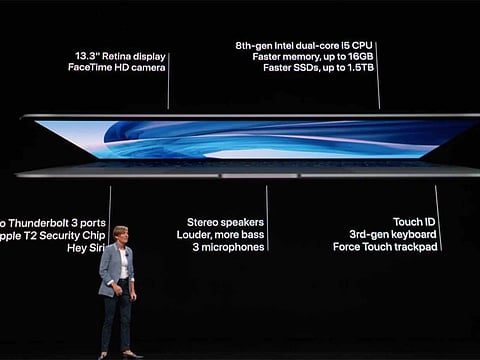Apple event live updates: iPads with facial recognition, Mac lineup updates
Apple is expected to unveil updates to its Mac computers and iPads that include facial recognition

Apple updates Mac mini
Apple is also updating its Mac mini. It is the first time the Mac mini has been updated since the end of 2014. Apple’s new Mac mini includes six-core processors and a space grey finish.
Originally introduced in 2005, the Mac mini has been a popular device for server storage environments and home media centers. In recent years, the computer hasn't seen any notable updates and was last equipped with faster processors in October of 2014. Like the MacBook Air, it got a major overhaul in 2010.
The new Mac mini is geared toward professional users and costs $799, up from $499 of the previous model. It includes faster processors, making it five times faster than the previous model. All Mac minis now use faster flash storage as well with capacities up to 2 terabytes, Apple said. It also goes on sale today, Apple said.
New Macbook Air at a glance
Etisalat launches eSIM for iPhone
Etisalat announced the launch of 12.1 iOS compatible eSIM for Apple devices.
Etisalat first introduced the first generation eSIM technology in May this year for the Apple Watch. With the announcement of the next generation eSIM.
Etisalat’s website said that customers who sign up for eSIM for Apple Watch Series 4 before December 15, 2018, will get the first three months free, following which a monthly charge of Dh25 will apply.
Subscribers can now access advanced features of the dual eSIM enabling them to use two mobile numbers on their latest iPhone devices. The new technology also enables subscribers to select an international roaming network while travelling out of UAE.
The unveiling of the second generation eSIM makes Etisalat the first operator in UAE to provide this technology on both iPhones and Apple Watch simultaneously, and comes in line with the telco’s efforts to become the region’s leading telecom operator in the world, bringing the most advanced technologies and services to be the first choice for subscribers in the UAE.
Apple announces new Macbook Air
The new MacBook Air includes the same 13-inch screen size as the previous model, but it is a higher-resolution Retina display, a feature that fans of the laptop have been requesting for years. It also includes thinner sides around the screen, shrinking the device's overall footprint. It has faster Intel Corp. processors, a Touch ID fingerprint scanner for logging, a larger trackpad, and better speakers.
The new MacBook Air is 10 percent thinner than the previous model and is a quarter-pound lighter. It has the same 12 hour battery life as the previous model. The Air's aluminum casing is made from 100 percent recycled aluminum, Apple said.
It will cost $1,199 and go on sale today, Cupertino, California-based Apple said.
iPads with facial recognition, Mac lineup updates expected
Apple Inc is expected to unveil updates to its Mac computers and iPads that include facial recognition features that have been available in the iPhone lineup at an event in Brooklyn.
Analysts expect a new versions of Apple's iPad Pro, its higher-end tablet computer that competes with the Microsoft Surface, with thinner bezels and more screen space, along with the face unlock system found on Apple's newer iPhones. They also expect updates to the firm's Mac lineup such as redesigned MacBook Air, Apple's $999 entry-level laptop.
Apple introduced new iPhones and Apple Watches last month, but the older product lines accounted for $45 billion in sales in the most recent fiscal quarter. In comparison, iPhones brought in revenue of $141.3 billion.
"They really wanted to show the world they haven't forgotten about the iPad and the Mac," said Mika Kitagawa, a senior principal research analyst at Gartner.
Apple declined to comment.
In July when Apple reported its most recent quarter, the company had its worst quarter of Mac sales since 2010, with unit volumes down 13 percent year over year. And iPad unit sales were up only 1 percent versus a year earlier, and revenue for both was down 5 percent from the prior year.
But some of that dip in Mac sales was explained by timing - Apple waited to release new Macs until July, when it had in previous years offered them in June. More broadly, Macs sales growth has outpaced the PC market and the iPad has been the most successful tablet in a market that simply turned out to be smaller than Apple hoped when it released the device in 2010.
While Apple has held prices down on some items like its entry-level iPads for schools, analyst do not expect it to do so with iPad Pros or Mac laptops. With Mac laptops in particular, consumers increasingly use phones or tablets for quick computing tasks and only reach for a full-fledged computer when they need extra horsepower. Apple is unlikely to cut corners to drop the price of its entry-level laptops, analysts said.
"With Apple, 'cheap' is always more expensive than everybody else," said Carolina Milanesi, an analyst at Creative Strategies. Apple is likely to pick a price where "you don't feel like you're breaking the bank, but you don't feel like you're compromising your experience."



